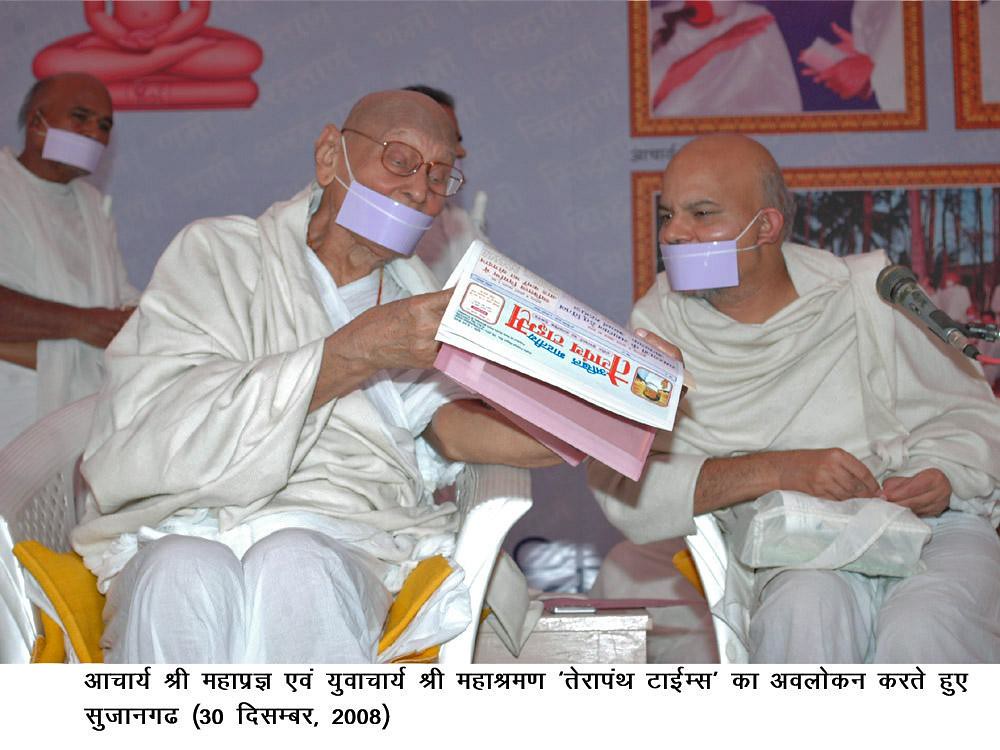Released on 12.11.2008 during 7th ICPNA at Jaipur, Rajasthan, India
Authored by
 |  | |
| Acharya Mahaprajna | & | APJ Abdul Kalam |
As we talk of rising economic prosperity and a strong and confident India, this book forcefully reminds us of the values that make for a truly sustainable society, al the heart of which is the family. For it is not economic growth or military strength alone that will make India strong. Sustainable success comes from values, and these can sustain a society, and a nation, even in times of hardship. The book expresses an ideal by which Indian society may prosper, and speaks of how spirituality can help create a noble nation and a better world. It provides a valuable counterpoint to the modem-day emphasis on consumerism and the philosophy of more is better, highlighting the sanctity of the natural world and its great power to evoke human creativity and love.
Writing on this crucial subject are two iconic Indians, Together Acharya Mahaprajna and A.EJ. Abdul Kalam, one a Jain muni revered as a saint, the other a visionary, a distinguished scientist and a former President, bring their vast experience to bear on this important subject. As the authors put it, it's only a strong and happy family that will lead to a noble nation, one that can be a true fulfillment of 5,000 years of India's civilization. The book takes up the difficult and pressing task of setting a new agenda in a time of radical social change. It shows us the path we need to follow to take India to its rightful place as a great nation.

First published in India in 2008 by
HarperCollins Publishers India
a joint venture with
The India Today Group
Copyright © Acharya Mahapragya and A.P.J. Abdul Kalam 2008
ISBN: 978-81-7223-747-9
Acharya Mahapragya and A.P.J. Abdul Kalam assert the moral right to
be identified as the authors of this book.
2 4 6 8 10 9 7 5 3 1
All rights reserved- No part of this publication may be reproduced,
stored in a retrieval system, or transmitted, in any form or by any
means, electronic, mechanical, photocopying, recording or otherwise,
without the prior permission of the publishers.
HarperCollins Publishers
A-53, Sector 57, NOIDA, Uttar Pradesh - 201,301, India
77-85 Fulham Palace Road, London W6 8.IB, United Kingdom
Hazelton I-anes, 55 Avenue Road, Suite 2900, Toronto, Ontario M5R 31.2
and 1995 Markham Road, Scarborough, Ontario M 1 B 5M8, Canada
25 Ryde Road, Pymble, Sydney, NSW 2073, Australia
31 View Road, Glenfield, Auckland 10. New Zealand
10 Eaat 53rd Street, New York NY 10022, USA
Typeset in 10.5/14 Century Schoolbook
Jojy Philip New Delhi - 11001ft
Printed and bound at
Thomson Press (India) Ltd.
Acknowledgements
vii
Birth of the Book
ix
PART 1: THE EVOLUTION 1
The Dynamics of Indian Culture
3
2
The Evolutionary Process and Pain
29
3
The Idea of Unity
62
PART 2: THE INDIVIDUAL, THE FAMILY AND THE NATION 4
Creating Healthy Individuals
99
5
The Birth of a Beautiful Home
133
6
Birth of a Noble Nation
166
Postscript
193
Notes
197
Index
207
About the Authors
215
About the Authors
ACHARYA MAHAPRAGYA
is one of the most celebrated Jain thinkers of the world and is the tenth Acharya of the Jain Shwetambar Terapanth sect. Born in 1920 in Tamkor village in the Jhunjhunu district of Rajasthan, he became a monk at the age of ten. He got his education under the guidance of Acharya Shri Tulsi, who launched the Anuvrat Movement in 1949 to rid the world of violence and hatred and free religion from sectarianism.
A multidimensional personality and a renowned expert on Indian and Western philosophy and religion, Acharya Mahapragya is an erudite scholar of Jain Agamas and a coordinator of science and spiritualism. A prolific writer, he has been called a 'modern Vivekananda'. He has traversed more than 100,000 kilometres on foot and visited 10,000villages to spread the message of nonviolence. To this purpose he embarked on an Ahimsa Yatra in 2001. He was honoured with the Communal Harmony Award in 2004 for his contribution in this field.
AVUL PAKIR JAINULABDEEN ABDUL KALAM
was the President of India from 2002 to 2007, and is the recipient of the nation's highest civilian award, the Bharat Ratna. Born in 1931 in Rameshwaram in Tamil Nadu, Dr Kalam studied aeronautical engineering at the Madras Institute of Technology. He played a key role in the development of India's first satellite launch vehicle, the SLV-3, and in the building and operationalization of India's strategic missile systems.
As Chairman of Technology Information, Forecasting and Assessment Council (TIFAC), he led an initiative with the help of 500 experts to arrive at Technology Vision 2020, giving a road map for transforming India into a developed nation. Dr Kalam has served as the Principal Scientific Advisor to the Government of India in the rank of Cabinet Minister, from November 1999 to November 2001, and was responsible for evolving policies, strategies and missions for many development applications.
As an elder statesman, he remains in the public eye for his role in offering counsel, reaching out to people and building bridges across religious and social divides. Dr Kalam's focus stays on transforming India into a developed nation by 2020 and to this end he has met and enthused three million youth.